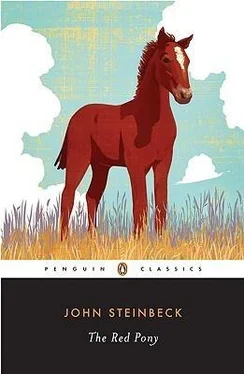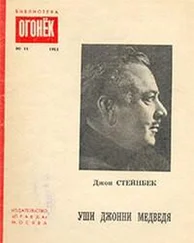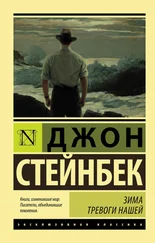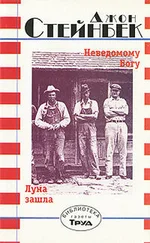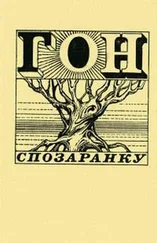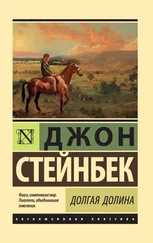He began putting his weight in a stirrup when Gabilan was saddled, but he didn’t throw his leg over the pony’s back. That was forbidden until Thanksgiving.
Every afternoon he put the red saddle on the pony and cinched it tight. The pony was learning already to fill his stomach out unnaturally large while the cinching was going on, and then to let it down when the straps were fixed. Sometimes Jody led him up to the brush line and let him drink from the round green tub, and sometimes he led him up through the stubble-field to the hilltop from which it was possible to see the white town of Salinas and the geometric fields of the great valley, and the oak trees clipped by the sheep. Now and then they broke through the brush and came to little cleared circles so hedged in that the world was gone and only the sky and the circle of brush were left from the old life. Gabilan liked these trips and showed it by keeping his head very high and by quivering his nostrils with interest. When the two came back from an expedition they smelled of the sweet sage they had forced through.
Time dragged on toward Thanksgiving, but winter came fast. The clouds swept down and hung all day over the land and brushed the hilltops, and the winds blew shrilly at night. All day the dry oak leaves drifted down from the trees until they covered the ground, and yet the trees were unchanged.
Jody had wished it might not rain before Thanksgiving, but it did. The brown earth turned dark and the trees glistened. The cut ends of the stubble turned black with mildew; the haystacks grayed from exposure to the damp, and on the roofs the moss, which had been all summer as gray as lizards, turned a brilliant yellow-green. During the week of rain, Jody kept the pony in the box stall out of the dampness, except for a little time after school when he took him out for exercise and to drink at the water-trough in the upper corral. Not once did Gabilan get wet.
The wet weather continued until little new grass appeared. Jody walked to school dressed in a slicker and short rubber boots. At length one morning the sun came out brightly. Jody, at his work in the box stall, said to Billy Buck, “Maybe I’ll leave Gabilan in the corral when I go to school today.”
“Be good for him to be out in the sun,” Billy assured him. “No animal likes to be cooped up too long. Your father and me are going back on the hill to clean the leaves out of the spring.” Billy nodded and picked his teeth with one of his little straws.
“If the rain comes, though—” Jody suggested.
“Not likely to rain today. She’s rained herself out.” Billy pulled up his sleeves and snapped his arm bands. “If it comes on to rain—why a little rain don’t hurt a horse.”
“Well, if it does come to rain, you put him in, will you, Billy? I’m scared he might get cold so I couldn’t ride him when the time comes.”
“Oh sure! I’ll watch out for him if we get back in time. But it won’t rain today.”
And so Jody, when he went to school, left Gabilan standing out in the corral.
Billy Buck wasn’t wrong about many things. He couldn’t be. But he was wrong about the weather for that day, for a little after noon the clouds pushed over the hills and the rain began to pour down. Jody heard it start on the schoolhouse roof. He considered holding up one finger for permission to go to the outhouse and, once outside, running home to put the pony in. Punishment would be prompt both at school and at home. He gave it up and took ease from Billy’s assurance that rain couldn’t hurt a horse. When school was finally out, he hurried home through the dark rain. The banks at the sides of the road spouted little jets of muddy water. The rain slanted and swirled under a cold and gusty wind. Jody dog-trotted home, slopping through the gravelly mud of the road.
From the top of the ridge he could see Gabilan standing miserably in the corral. The red coat was almost black, and streaked with water. He stood head down with his rump to the rain and wind. Jody arrived running and threw open the barn door and led the wet pony in by his forelock. Then he found a gunny sack and rubbed the soaked hair and rubbed the legs and ankles. Gabilan stood patiently, but he trembled in gusts like the wind.
When he had dried the pony as well as he could, Jody went up to the house and brought hot water down to the barn and soaked the grain in it. Gabilan was not very hungry. He nibbled at the hot mash, but he was not very much interested in it, and he still shivered now and then. A little steam rose from his damp back.
It was almost dark when Billy Buck and Carl Tiflin came home. “When the rain started we put up at Ben Herche’s place, and the rain never let up all afternoon,” Carl Tiflin explained. Jody looked reproachfully at Billy Buck and Billy felt guilty.
“You said it wouldn’t rain,” Jody accused him.
Billy looked away. “It’s hard to tell, this time of year,” he said, but his excuse was lame. He had no right to be fallible, and he knew it.
“The pony got wet, got soaked through.”
“Did you dry him off?”
“I rubbed him with a sack and I gave him hot grain.”
Billy nodded in agreement.
“Do you think he’ll take cold, Billy?”
“A little rain never hurt anything,” Billy assured him.
Jody’s father joined the conversation then and lectured the boy a little. “A horse,” he said, “isn’t any lap-dog kind of thing.” Carl Tiflin hated weakness and sickness, and he held a violent contempt for helplessness.
Jody’s mother put a platter of steaks on the table and boiled potatoes and boiled squash, which clouded the room with their steam. They sat down to eat. Carl Tiflin still grumbled about weakness put into animals and men by too much coddling.
Billy Buck felt bad about his mistake. “Did you blanket him?” he asked.
“No. I couldn’t find any blanket. I laid some sacks over his back.”
“We’ll go down and cover him up after we eat, then.” Billy felt better about it then. When Jody’s father had gone in to the fire and his mother was washing dishes, Billy found and lighted a lantern. He and Jody walked through the mud to the barn. The barn was dark and warm and sweet. The horses still munched their evening hay. “You hold the lantern!” Billy ordered. And he felt the pony’s legs and tested the heat of the flanks. He put his cheek against the pony’s gray muzzle and then he rolled up the eyelids to look at the eyeballs and he lifted the lips to see the gums, and he put his fingers inside his ears. “He don’t seem so chipper,” Billy said. “I’ll give him a rubdown.”
Then Billy found a sack and rubbed the pony’s legs violently and he rubbed the chest and the withers. Gabilan was strangely spiritless. He submitted patiently to the rubbing. At last Billy brought an old cotton comforter from the saddle-room, and threw it over the pony’s back and tied it at neck and chest with string.
“Now he’ll be all right in the morning,” Billy said.
* * *
Jody’s mother looked up when he got back to the house. “You’re late up from bed,” she said. She held his chin in her hard hand and brushed the tangled hair out of his eyes and she said, “Don’t worry about the pony. He’ll be all right. Billy’s as good as any horse doctor in the country.”
Jody hadn’t known she could see his worry. He pulled gently away from her and knelt down in front of the fireplace until it burned his stomach. He scorched himself through and then went in to bed, but it was a hard thing to go to sleep. He awakened after what seemed a long time. The room was dark but there was a grayness in the window like that which precedes the dawn. He got up and found his overalls and searched for the legs, and then the clock in the other room struck two. He laid his clothes down and got back into bed. It was broad daylight when he awakened again. For the first time he had slept through the ringing of the triangle. He leaped up, flung on his clothes and went out of the door still buttoning his shirt. His mother looked after him for a moment and then went quietly back to her work. Her eyes were brooding and kind. Now and then her mouth smiled a little but without changing her eyes at all.
Читать дальше
